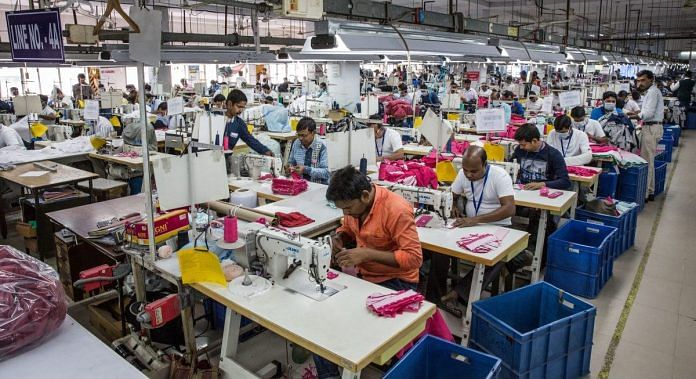The GDP growth numbers for the second quarter of 2019-20 at 4.5 per cent confirm the expectations of a growth slowdown.
The most worrying part of the slowdown is the manufacturing sector. The growth this year has been particularly bad, declining from 0.6 per cent in Q1 to -1.0 in Q2. This estimate is based on the index of industrial production, whose data is out and was already showing signs of a sharp decline.
The sector is not just slowing down. It produced 1 per cent less output than what it produced in the July-to-September quarter last year. For a large emerging economy, usually, growth chugs along. It might witness a slowdown, but it rarely witnesses a contraction.
While it is true that the economy is not contracting overall, the contraction in manufacturing and the slowdown in the rest of the sectors are reasons to take the problem seriously and chalk out a path of reform.
This kind of slowdown cannot be solved by an injection of demand. Of course, even that would be difficult given the limited capacity of the financial sector to do monetary policy transmission and for the government to spend money. There are no magic bullets or short cuts.
Also read: Private banks are also in trouble, Modi govt must act now to set up resolution capability
More policy changes needed
One of the main factors behind the slowdown is policy changes. Some of these policy changes are positive, such as the Insolvency and Bankruptcy Code, GST and inflation targeting. However, these changes needed other changes to accompany them. Those changes need to be made.
For example, well-functioning courts are needed for the IBC to work. A competitive financial system is needed for inflation targeting to work. A conducive business environment is required for entry and expansion of formal sector firms.
Investors respond by saying there is policy uncertainty. This translates into saying that policy keeps changing frequently and their businesses cannot make plans for investing because they cannot predict what will happen next.
Solving this requires that policies should be made after much debate and discussion by experts with feet on the ground, so that instead of launching into something quickly, pros and cons are considered. This requires building teams with capability as well as openness to criticism.
Politicians have to take responsibility
In addition, politicians at the helm have to take responsibility for their decisions and have to create political support and consensus, so that businesses are informed of policy changes at early stages. If policies are going to be announced and then frequently changed or not followed up, businesses will not be able to trust the system and put their money in.
Today, bankruptcy tribunals are overloaded. Thousands of crores are locked in bad debt and dead firms. If adequate work had been done in preparation before the process was launched, some of the issues being faced today could have been avoided. The first wave of the bankruptcy process was not going to be a breeze. It was known that greater preparation was needed.
India is in transition from an informal to a formal economy. If formal sector firms have to expand, they need less government regulation, availability of credit, infrastructure and a less-threatening tax structure. The government needs to look at how to create such conditions.
Also read: India cannot be a $5 trillion economy if Modi govt gives in to protectionist lobbies
The author is an economist and a professor at the National Institute of Public Finance and Policy. Views are personal.




ENTIRE ECONOMY IN IC U. NOT BECAECAUE OF ECONOMIST BUT BECAUSE OF POLITICIANS. THERE SHOULD BE PEACE IN THE STATE. THAT IS DITURBED BECAUSE OF N A A AND ABROGATION OF 370. COVID 19 HAS WORSEND IT. CHINESE AGRESSION ADDED
FUEL TO TREMLING ECONOMY.
Reddy in Andra is the best example of economic foolishness.
The government has a Chief Economic Advisor. I am sure that as a professional, he must have placed som major proposals before the government for course correction and economic reforms. Hopefully, the government is not shy of taking professional advice either from the CEA or the NITI Ayog. Heaven help is, if the present FM decides go alone at it.
By all accounts, the CEA learnt of demonetisation from watching his TV, as the rest of us did.
Solving this requires … openness to criticism. That paragraph encapsulates what is missing in decision making, on the economy and virtually everything else.